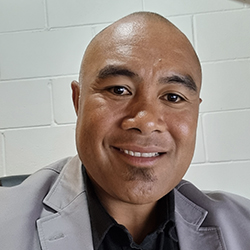
PhD (2014)
Peni is currently a senior lecturer at the Auckland University of Technology. Born in Tonga, Peni attended Mangaia Primary School, Tonga High School, and completed further studies in New Zealand, Fiji and Australia.
He has been in the corporate sector for nearly ten years, but is now working in academia. Peni has worked in Tonga, Fiji, Papua New Guinea, Australia, and New Zealand.
He loves tennis, singing, sociology, preparing financial reports and accounting research. Peni was also recently introduced to golf and regrets not trying it sooner.
Peni completed his PhD with CBE’s Research School of Accounting in 2014.
20 April 2022
How has studying at ANU supported your research and current activities – working with rural and indigenous communities across Australia and the Pacific?
It is about the subject content (accounting) and more. The culture and internalised work ethic of being an ANU researcher cannot be taken for granted. Of course, at ANU, you work with some of the most brilliant accounting brains, not just nationally and regionally, but in the world. The constant encouragement to be excellent in research comes with lifetime dispositions, including tenacity, precision and resilience.
The University’s credibility opens doors and offers opportunities. I am heavily involved in voluntary work serving people across the Pacific. This includes volunteering for sports committees, education non-profit organisations and the church in governance roles. My research work is predominantly in the Indigenous spaces, where I explore how accounting language, regulations, and mechanisms enable and constrain indigenous wellbeing. This bit of my research is extremely satisfying.
Do you have any advice or suggestions for students on identifying interesting research topics?
The short answer is that ‘interesting’ is relative and defined differently in different spaces. What is interesting to the researcher may not be attractive to the research community. So in identifying an interesting research topic, first find a topic that interests you, and then determine what is currently interesting to the research community. This is negotiated with your mentor or supervisor. It will save you much hurt if you listen to your mentor or supervisor.
What brings you the greatest joy in your work today?
Teaching and researching are the greatest joys in my work. Interacting with students, whether through classroom work or co-formulating a research agenda, is immensely satisfying. Sharing research ideas with others, some halfway across the world, is also very exciting, and that brings the greatest joy in my work.
Do you have more advice you would like to share with our current HDR students?
I will share a bit of my practical research experience, which relates to student-specific workability.
Earlier in my career, I recognised how reluctant I was to delete what I had written. It was painful to remove a paragraph or a sentence after sweating to formulate them. Eventually, they got binned, but I could have saved a research day or two if I had binned them earlier. I then created my “research bin”, and my painful-to-let go pieces of writing went into this bin. I deleted some of my writings, but not entirely, because it would still stay in that “research bin”; and in some weird way that knowledge provided a practical way forward. I am not advising that students should have a research bin. My point is that there is broad research advice available, but here and there, the student-specific workables are for the student to work out. Find yours sooner rather than later.
